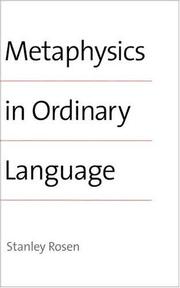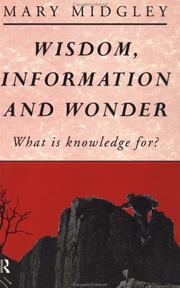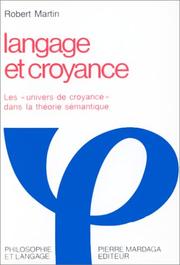| Listing 1 - 9 of 9 |
Sort by
|
Book
ISBN: 0674064771 0674068483 9780674068483 9780674064775 9780674055223 0674055225 Year: 2012 Publisher: Cambridge, MA
Abstract | Keywords | Export | Availability | Bookmark
 Loading...
Loading...Choose an application
- Reference Manager
- EndNote
- RefWorks (Direct export to RefWorks)
A new form of philosophizing known as ordinary language philosophy took root in England after the Second World War, promising a fresh start and a way out of long-standing dead-end philosophical debates. Pioneered by Wittgenstein, Austin, and others, OLP is now widely rumored, within mainstream analytic philosophy, to have been seriously discredited, and consequently its perspective is ignored. Avner Baz begs to differ. In When Words Are Called For, he shows how the prevailing arguments against OLP collapse under close scrutiny. All of them, he claims, presuppose one version or another of the very conception of word-meaning that OLP calls into question and takes to be responsible for many traditional philosophical difficulties. Worse, analytic philosophy itself has suffered as a result of its failure to take OLP's perspective seriously. Baz blames a neglect of OLP's insights for seemingly irresolvable disputes over the methodological relevance of "intuitions" in philosophy and for misunderstandings between contextualists and anti-contextualists (or "invariantists") in epistemology. Baz goes on to explore the deep affinities between Kant's work and OLP and suggests ways that OLP could be applied to other philosophically troublesome concepts. When Words Are Called For defends OLP not as a doctrine but as a form of practice that might provide a viable alternative to work currently carried out within mainstream analytic philosophy. Accordingly, Baz does not merely argue for OLP but, all the more convincingly, practices it in this eye-opening book.

ISBN: 0300150466 0585380465 9780585380469 9780300150469 0300074786 9780300074789 Year: 1999 Publisher: New Haven [Conn.] Yale University Press
Abstract | Keywords | Export | Availability | Bookmark
 Loading...
Loading...Choose an application
- Reference Manager
- EndNote
- RefWorks (Direct export to RefWorks)
In this rich collection of philosophical writings, Stanley Rosen addresses a wide range of topics-from eros, poetry, and freedom to problems like negation and the epistemological status of sense perception. Though diverse in subject, Rosen's essays share two unifying principles: there can be no legitimate separation of textual hermeneutics from philosophical analysis, and philosophical investigation must be oriented in terms of everyday language and experience, although it cannot simply remain within these confines. Ordinary experience provides a minimal criterion for the assessment of extraordinary discourses, Rosen argues, and without such a criterion we would have no basis for evaluating conflicting discourses: philosophy would give way to poetry.Philosophical problems are not so deeply embedded in a specific historical context that they cannot be restated in terms as valid for us today as they were for those who formulated them, the author maintains. Rosen shows that the history of philosophy-a story of conflicting interpretations of human life and the structure of intelligibility-is a story that comes to life only when it is rethought in terms of the philosophical problems of our own personal and historical situation.
Philosophy. --- Ordinary-language philosophy. --- Ordinary-language philosophy --- Philosophy --- Philosophy & Religion --- Ordinary-language analysis --- Ordinary-language method --- Philosophy, Ordinary-language --- Analysis (Philosophy) --- Language and languages --- Mental philosophy --- Humanities --- Metaphysics
Book
ISBN: 3540093869 3642673090 3642673074 9783540093862 Year: 1979 Volume: 4 Publisher: Berlin Springer
Abstract | Keywords | Export | Availability | Bookmark
 Loading...
Loading...Choose an application
- Reference Manager
- EndNote
- RefWorks (Direct export to RefWorks)
Psycholinguistics --- Language. --- Languages --- Dialect --- Dialects --- Language and logic --- Inference --- Reasoning --- Ordinary-language philosophy --- Language

ISBN: 1134971923 1280182202 020300387X 9780203003879 0415028302 9781134971879 9781134971916 9780415028301 9781138141261 Year: 1991 Publisher: London New York Routledge
Abstract | Keywords | Export | Availability | Bookmark
 Loading...
Loading...Choose an application
- Reference Manager
- EndNote
- RefWorks (Direct export to RefWorks)
In this book one of Britain's leading philosophers tackles a question at the root of our civilisation: What is knowledge for? Midgley rejects the fragmentary and specialized way in which information is conveyed in the high-tech world, and criticizes conceptions of philosophy that support this mode of thinking.
Philosophy. --- Ordinary-language philosophy. --- Ordinary-language analysis --- Ordinary-language method --- Philosophy, Ordinary-language --- Analysis (Philosophy) --- Language and languages --- Mental philosophy --- Humanities --- Philosophy
Book
ISBN: 0226924866 9780226924861 Year: 2012 Publisher: Chicago University of Chicago Press
Abstract | Keywords | Export | Availability | Bookmark
 Loading...
Loading...Choose an application
- Reference Manager
- EndNote
- RefWorks (Direct export to RefWorks)
Marjorie Perloff, among our foremost critics of twentieth-century poetry, argues that Ludwig Wittgenstein provided writers with a radical new aesthetic, a key to recognizing the inescapable strangeness of ordinary language. Taking seriously Wittgenstein's remark that "philosophy ought really to be written only as a form of poetry," Perloff begins by discussing Wittgenstein the "poet." What we learn is that the poetics of everyday life is anything but banal. "This book has the lucidity and the intelligence we have come to expect from Marjorie Perloff.-Linda Munk, American Literature "[Perloff] has brilliantly adapted Wittgenstein's conception of meaning and use to an analysis of contemporary language poetry."-Linda Voris, Boston Review "Wittgenstein's Ladder offers significant insights into the current state of poetry, literature, and literary study. Perloff emphasizes the vitality of reading and thinking about poetry, and the absolute necessity of pushing against the boundaries that define and limit our worlds."-David Clippinger, Chicago Review "Majorie Perloff has done more to illuminate our understanding of twentieth century poetic language than perhaps any other critic. . . . Entertaining, witty, and above all highly original."-Willard Bohn, Sub-Stance
Literature --- Criticism. --- Criticism --- Evaluation of literature --- Literary criticism --- Rhetoric --- Aesthetics --- Literature and philosophy --- Philosophy and literature --- Philosophy. --- Technique --- Evaluation --- Theory --- Wittgenstein, Ludwig, --- Wei-tʻe-ken-ssu-tʻan, --- Wei-tʻe-ken-ssu-tʻan, Lu-te-wei-hsi, --- Wittgenstein, L. --- Vitgenshteĭn, L., --- Wei-ken-ssu-tʻan, --- Pitʻŭgensyutʻain, --- Vitgenshteĭn, Li︠u︡dvig, --- Weitegenshitan, --- Wittgenstein, Ludovicus, --- Vitgenshtaĭn, Ludvig, --- ויטגנשטיין, לודוויג --- 维特根斯坦, --- Wittgenstein, Ludwig Josef Johann, --- ordinary language, philosophy, modernism, poetry, gertrude stein, tractatus, repetition, thomas bernhard, philosophical investigations, notes on logic, ingeborg bachmann, avant garde, german poets, god, the self, mystical, mundane, classics, literary criticism.
Book
ISBN: 9780231166706 9780231166713 9780231537179 0231537174 0231166702 0231166710 Year: 2014 Publisher: New York
Abstract | Keywords | Export | Availability | Bookmark
 Loading...
Loading...Choose an application
- Reference Manager
- EndNote
- RefWorks (Direct export to RefWorks)
Raoul Moati intervenes in the critical debate that divided two prominent philosophers in the mid-twentieth century. In the 1950's, the British philosopher J. L. Austin advanced a theory of speech acts, or the "performative," that Jacques Derrida and John R. Searle interpreted in fundamentally different ways. Their disagreement centered on the issue of intentionality, which Derrida understood phenomenologically and Searle read pragmatically. The controversy had profound implications for the development of contemporary philosophy, which, Moati argues, can profit greatly by returning to this classic debate. In this book, Moati systematically replays the historical encounter between Austin, Derrida, and Searle and the disruption that caused the lasting break between Anglo-American language philosophy and continental traditions of phenomenology and its deconstruction. The key issue, Moati argues, is not whether "intentionality," a concept derived from Husserl's phenomenology, can or cannot be linked to Austin's speech-acts as defined in his groundbreaking How to Do Things with Words, but rather the emphasis Searle placed on the performativity and determined pragmatic values of Austin's speech-acts, whereas Derrida insisted on the trace of writing behind every act of speech and the iterability of signs in different contexts.
Derrida, Jacques --- Searle, John R. --- Language and languages --- Performative (Philosophy) --- Speech acts (Linguistics) --- Ordinary-language philosophy. --- Deconstruction. --- Intentionality (Philosophy) --- Act (Philosophy) --- Mind and body --- Philosophy --- Criticism --- Semiotics and literature --- Ordinary-language analysis --- Ordinary-language method --- Philosophy, Ordinary-language --- Analysis (Philosophy) --- Illocutionary acts (Linguistics) --- Speech act theory (Linguistics) --- Speech events (Linguistics) --- Linguistics --- Speech --- Performativity (Philosophy) --- Methodology --- Semantics (Philosophy) --- Foreign languages --- Languages --- Anthropology --- Communication --- Ethnology --- Information theory --- Meaning (Psychology) --- Philology --- Derrida, Jacques. --- Searle, J. R. --- Searle, John Rogers --- 존 설 --- Derrida, J. --- Derida, Žak --- Derrida, Jackes --- Derrida, Zhak --- Deridah, Z'aḳ --- Deridā, Jāka --- Dirīdā, Jāk --- Деррида, Жак --- דרידה, ז'אק

ISBN: 2870092857 9782870092859 Year: 1987 Volume: vol *63 Publisher: Bruxelles : Pierre Mardaga,
Abstract | Keywords | Export | Availability | Bookmark
 Loading...
Loading...Choose an application
- Reference Manager
- EndNote
- RefWorks (Direct export to RefWorks)
Lexicology. Semantics --- Philosophy of language --- French language --- Analyse (Filosofie) --- Analyse (Philosophie) --- Analyse linguistique (Philosophie) --- Analysis (Philosophy) --- Analysis [Linguistic ] (Philosophy) --- Analysis [Logical ] --- Analysis [Philosophical ] --- Analytical philosophy --- Analytische filosofie --- Epistemics --- Epistémique --- Filosofie --- Filosofie van de natuurlijke taal --- Filosofische taalanalyse --- Lecture religieuse --- Linguistic analysis (Filosofie) --- Linguistic analysis (Philosophy) --- Logical analysis --- Ordinary-language philosophy --- Philosophical analysis --- Philosophie --- Philosophie analytique --- Philosophie du langage ordinaire --- Philosophy [Analytical ] --- Religieuze lectuur --- Semantics (Philosophy) --- Semantiek (Filosofie) --- Sémantique (Philosophie) --- Language and languages --- Philosophy --- LINGUISTIQUE --- SEMANTIQUE --- Langage et logique --- Énonciation (linguistique) --- Philosophie du langage --- Sémantique --- Croyances populaires --- Doute --- Croyance (philosophie) --- 800.1 --- -Semantics (Philosophy) --- Intension (Philosophy) --- Logical semantics --- Semantics (Logic) --- Semeiotics --- Significs --- Syntactics --- Unified science --- Logic, Symbolic and mathematical --- Logical positivism --- Meaning (Psychology) --- Philosophy, Modern --- Semiotics --- Signs and symbols --- Symbolism --- Definition (Philosophy) --- Foreign languages --- Languages --- Anthropology --- Communication --- Ethnology --- Information theory --- Philology --- Linguistics --- Taalfilosofie --- Philosophy. --- 800.1 Taalfilosofie --- Semantics (Philosophy). --- Sémantique. --- Langage et logique. --- Philosophie du langage. --- Croyances populaires. --- Doute. --- Language and languages - Philosophy
Book
ISBN: 069110171X 0691072949 0691612188 1400857368 1306993245 9780691072944 9781400857364 9780691101712 9780691612188 Year: 2014 Publisher: Princeton, NJ
Abstract | Keywords | Export | Availability | Bookmark
 Loading...
Loading...Choose an application
- Reference Manager
- EndNote
- RefWorks (Direct export to RefWorks)
This book contains important technical innovations, including comparative measures for the testable content, depth, and unity of scientific theories.Originally published in 1984.The Princeton Legacy Library uses the latest print-on-demand technology to again make available previously out-of-print books from the distinguished backlist of Princeton University Press. These editions preserve the original texts of these important books while presenting them in durable paperback and hardcover editions. The goal of the Princeton Legacy Library is to vastly increase access to the rich scholarly heritage found in the thousands of books published by Princeton University Press since its founding in 1905.
Science --- Skepticism --- Rationalism --- Knowledge, Theory of --- Philosophy --- -Skepticism --- Scepticism --- Unbelief --- Agnosticism --- Belief and doubt --- Free thought --- Natural science --- Science of science --- Sciences --- Religion --- Deism --- Realism --- Epistemology --- Theory of knowledge --- Psychology --- Knowledge, Theory of. --- Rationalism. --- Skepticism. --- Philosophy. --- Normal science --- Philosophy of science --- wetenschap --- filosofie --- maatschappijkritiek --- Science - Philosophy --- A priori and a posteriori. --- A priori probability. --- Ad hoc. --- Ad hominem. --- Agnosticism. --- Almost surely. --- Analytic–synthetic distinction. --- Anti-realism. --- Antireductionism. --- Asymmetry. --- Atomism. --- Axiom. --- Bayesian probability. --- Bayesian statistics. --- Bayesian. --- Begging the question. --- Certainty. --- Circular reasoning. --- Classical logic. --- Classical physics. --- Contradiction. --- David Hume. --- Deductive reasoning. --- Deductive-nomological model. --- Determinism. --- Dialectician. --- Edmund Husserl. --- Explanation. --- Explanatory power. --- Extrapolation. --- Fair coin. --- Fallibilism. --- Falsifiability. --- Falsity. --- Fideism. --- First principle. --- Form of life (philosophy). --- Free parameter. --- Good and evil. --- Hilary Putnam. --- Holism. --- Hypothesis. --- Idealism. --- Impenetrability. --- Inductive reasoning. --- Inductivism. --- Inference. --- Infinite regress. --- Instance (computer science). --- Is–ought problem. --- J. L. Austin. --- Logical reasoning. --- Lottery paradox. --- Magical thinking. --- Materialism. --- Michael Polanyi. --- Modern physics. --- Modus tollens. --- Mutual exclusivity. --- Neutral monism. --- Occam's razor. --- Ontology. --- Ordinary language philosophy. --- Ought implies can. --- Paradox. --- Persuasive definition. --- Phenomenalism. --- Philosopher. --- Phrenology. --- Possible world. --- Posterior probability. --- Pre-established harmony. --- Prediction. --- Predictive power. --- Premise. --- Probabilism. --- Probability. --- Problem of induction. --- Pseudoscience. --- Pyrrhonism. --- Rationality. --- Reality. --- Reason. --- Received view. --- Reductionism. --- Relativism. --- Requirement. --- Richard Jeffrey. --- Scientific realism. --- Scientific theory. --- Sensationalism. --- Suggestion. --- Tautology (rhetoric). --- Testability. --- Theory. --- Transcendental arguments. --- Truism. --- Verisimilitude. --- Wrong direction.
Book
ISBN: 1283519291 9786613831743 140084195X 9781400841950 6613831743 9780691148403 0691148406 9781283519298 Year: 2012 Publisher: Princeton, NJ
Abstract | Keywords | Export | Availability | Bookmark
 Loading...
Loading...Choose an application
- Reference Manager
- EndNote
- RefWorks (Direct export to RefWorks)
The Making of Modern Liberalism is a deep and wide-ranging exploration of the origins and nature of liberalism from the Enlightenment through its triumphs and setbacks in the twentieth century and beyond. The book is the fruit of the more than four decades during which Alan Ryan, one of the world's leading political thinkers, reflected on the past of the liberal tradition-and worried about its future.This is essential reading for anyone interested in political theory or the history of liberalism.
Liberalism --- History. --- Alexander Herzen. --- Alexis de Tocqueville. --- Autobiography. --- Bertrand Russell. --- East India Company. --- Enlightenment. --- Hannah Arendt. --- India. --- Isaiah Berlin. --- Jean-Jacques Rousseau. --- John Locke. --- John Rawls. --- John Stuart Mill. --- Joseph de Maistre. --- Karl Popper. --- L. T. Hobhouse. --- Leviathan. --- Marxism. --- Niccolo Machiavelli. --- On Liberty. --- Samuel Taylor Coleridge. --- T. H. Green. --- The Subjection of Women. --- Thomas Hobbes. --- Vietnam War. --- Whig Revolution. --- World War II. --- absolutism. --- adjectival freedom. --- administration. --- administrative reform. --- adverbial freedom. --- anti-Americanism. --- anti-imperialism. --- atomism. --- authority. --- autonomy. --- brutalization. --- bureaucracy. --- capitalism. --- civil service. --- coercion. --- communitarianism. --- community. --- criminal justice system. --- culture. --- death penalty. --- democracy. --- disenchantment. --- empire. --- epistemological antiauthoritarianism. --- equality. --- ethics. --- fairness. --- free will. --- freedom of speech. --- freedom. --- government. --- human nature. --- human rights. --- incarceration. --- individualism. --- individuality. --- inner life. --- intervention. --- justice. --- law of nature. --- legitimacy. --- liberal anxieties. --- liberal community. --- liberal education. --- liberal imperialism. --- liberal interventionism. --- liberalism. --- libertarianism. --- liberty. --- marriage. --- mechanical materialism. --- meritocracy. --- moral authority. --- natural rights. --- natural theology. --- obligation. --- opinion. --- ordinary language philosophy. --- ordinary warfare. --- pacifism. --- participatory democracy. --- passivity. --- patriotism. --- philosophical engineering. --- philosophy. --- physics. --- physiology. --- pluralism. --- poetry. --- political liberalism. --- political obligation. --- political philosophy. --- political theory. --- politics. --- progress. --- property. --- psychology. --- punishment. --- rationality of science. --- red terror. --- religion. --- religious authority. --- religious belief. --- religious dissent. --- republicanism. --- rights. --- romantic conservatism. --- science. --- self-assertion. --- self-maintenance. --- self-preservation. --- self-realization. --- self-sufficiency. --- social identity. --- state. --- terror. --- terrorism. --- terrorist states. --- toleration. --- utilitarianism. --- utility. --- violence. --- welfare state. --- white terror.
| Listing 1 - 9 of 9 |
Sort by
|

 Search
Search Feedback
Feedback About UniCat
About UniCat  Help
Help News
News